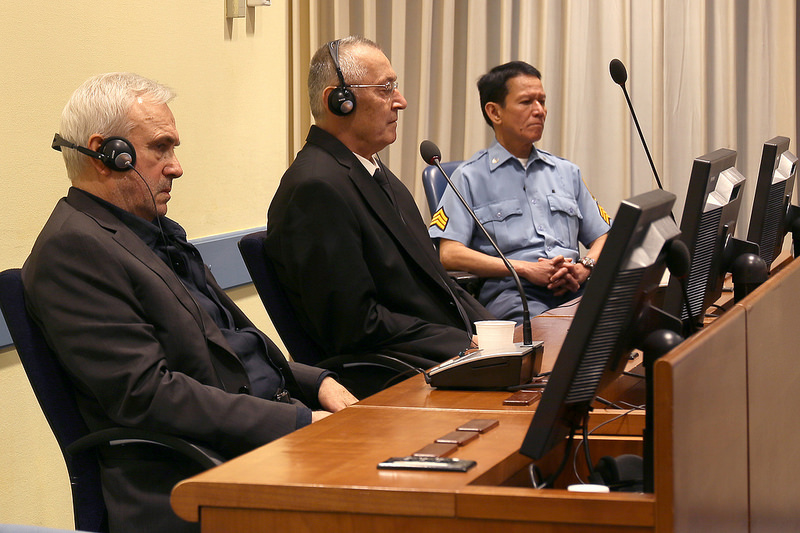Home
STANISIC AND SIMATOVIC "RESIT TRIAL" OPENED
The prosecution delivered its opening statement at the start of the new trial of the two former heads of the Serbian State Security Service today before the Mechanism for International Criminal Tribunals. The pair are charged with being part of a joint criminal enterprise whose goal was to forcibly and permanently eliminate non-Serbs from large parts of Croatia and Bosnia and Herzegovina
 Jovica Stanišić and Franko Simatović in MICT courtroom
Jovica Stanišić and Franko Simatović in MICT courtroom Eighteen months after the Appeals Chamber quashed the acquittal of the two former heads of the Serbian State Security Service, the two accused, Jovica Stanisic and Franko Simatovic, appeared in The Hague at the start of the retrial.
This is the second case to see a retrial in the almost 25 years of the Tribunal's existence. The first retrial was ordered in the case against Ramush Haradinaj and his two associates. This time, however, the retrial will proceed before the Tribunal's 'heir': The Mechanism for International Criminal Tribunals, or the MICT. As the presiding judge Burton Hall, of Bahamas, stated at the outset, this will be 'the first trial before the Mechanism which builds on the rich tradition of its predecessor'. The Chamber also comprises judges Seon Ki Park, of South Korea, and Joseph Masancha, of Tanzania.
As prosecutor Douglas Stringer recalled at the beginning of his opening statement, Stanisic ans Simatovic have been charged based on their superior role, as participants in a joint criminal enterprise whose goal was to forcibly and permanently remove non-Serbs from large swathes of Croatia and BH. The goal of the enterprise was achieved through a campaign of murder, deportation, forcible transfer and persecution of non-Serbs.
As Stringer went on to tell the court, Stanisic and Simatovic used the State Security Service, its personnel and resources, to achieve the goals of the joint criminal enterprise. They established an elite unit which operated outside of Serbia's borders. It was called simply 'the Unit' or 'Frenki's men'. Later, it came to be called the Red Berets, they also set up other units that had the same purpose, financed them and aided and abetted their operation in other ways.
All the crimes Stanisic and Simatovic are charged with, Stringed stressed, were committed in an armed conflict, but they were not just accidental collateral damage. According to the prosecutor, those crimes were an intended part of the plan to force non-Serbs to leave certain territories. Civilians were not just collateral victims of the war; they were its intended target and the goal was to eliminate them.
Although Judge Orie's Trial Chamber did find in the trial judgment that crimes had been committed against Croats and Muslims in the SAO Krajina and SAO Slavonia, Baranja and Western Srem (in Croatia) and in the BH municipalities ofBijeljina, Bosanski Šamac, Doboj, Sanski Most, Trnovo and Zvornik, in May 2013 the judges acquitted the two accused with a majority vote (with a very harshly worded dissenting opinion of Judge Picard.
The Appeals Chamber decided that the Trial Chamber had made two substantial legal errora. First of all, the judges failed to establish 'the existence and scope' of the criminal plan before establishing whether the accused had the intent to contribute to the joint criminal enteprise. Secondly, there was a problem with the standard applied by the Trial Chamber, which was 'specific direction'. The standard was set in the appellate judgment in Momcilo Perisic's case, and was later abandoned. According to that standard, in order to establish whether a person is responsible for aiding and abetting crimes, the judges must assess whether the acts of the accused were 'specifically directed" at the commission of the crimes. The majority in the Trial Chamber decided that the units controlled by Stanisic and Simatovic had committed crimes in Samac, Diboj and SAO KRajina, but the assistance provided by the accused to those units had not been 'specifically directed' at the commission of crimes but, possibly, at the effort 'to establish and maintain Serb control over those territories'.
Reacting to this conclusion in the first-instance judgment, prosecutor Stringer today highlighted the systematic nature of the operations in which power was seized in the various areas by the forces organized, armed and financed by the Serbian State Security Service and the crimes that followed. According to him, this proves that the accused were involved in the joint criminal enterprise and shared the intent behind it. Stringer identified the key players in the joint criminal enterprise: in addition to the two accused, there was Slobodan Milosevic, generals Veljko Kadijevic and Blagoje Adzic, Radmilo Bogdanovic, Zeljko Raznatovic Arkan, Radovan Stojicic Badza and three former RSK presidents: Babic, Martic and Hadzic..
In the afternoon, prosecutor Adam Weber will take over and talk abiut the operations conducted by the accused and their units in Bosnia and Herzegovina.
Linked Reports
- Case : Stanisic & Simatovic
- 2017-05-19 JOVICA STANISIC WILL RETURN TO THE HAGUE FOR HIS RETRIAL
- 2017-05-17 STANISIC AND SIMATOVIC RETRIAL SCHEDULED FOR 13 JUNE
- 2017-04-08 STANISIC AND SIMATOVIC RETRIAL TO BEGIN IN MAY
- 2017-06-14 NEW TRIAL REPRISES THE FIRST ONE
- 2017-06-15 'RECYCLING' WITNESSES AND QUESTIONS
- 2017-06-27 IRREGULAR FORMATIONS ROLE IN THE WORST PART OF ETHNIC CLEANSING
